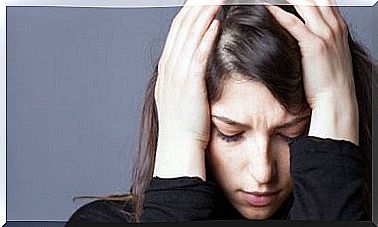What Should You Do In An Anxiety Attack? 4 Tips That Help
Anxiety attacks are panic situations that paralyze the patient, affecting their mental and physical health. We will tell you how to deal with them in the next article.

Anxiety attacks are, unfortunately, very common today. They are usually related to psychosocial factors, but they can also be due to multiple unrelated causes.
In this article we reflect on this disorder and share what should be the courses of action to treat them. However, personalized diagnosis and treatment must always be essential.
Let’s go deeper.
Panic attack and anxiety crisis: different names for the same problem
According to the Mayo Clinic, a panic attack is an episode of intense and sudden fear. Its symptoms may be the following, although they vary from person to person:
- Palpitations
- Sweating
- Shaking.
- Dry mouth
- Difficulty breathing and a feeling of suffocation.
- Chest pain.
- Nausea and abdominal discomfort.
- Feeling of unreality.
- Paresthesia.
Why is this triggered? The factor that causes them cannot always be defined, so they are unpredictable.
However, some people do learn to detect the situations that condition these crises, so they learn to avoid them.
Treatment of anxiety attacks
This study carried out by a team from the University Medical Center in Gottingen (Germany) shows the difficulties that may exist in the treatment of anxiety attacks and which are usually due to different issues:
- The affected person does not ask for professional help.
- The guidelines for treating crises with psychological support and medication are not clear or are not followed, according to each case, at the outpatient level.
It is important to emphasize that the affected person should receive a psychological diagnosis of their disorder, the possible causes and the available treatments. They should assess psychotherapy, drugs and other possible routes of action after a personalized analysis.
The age of the patient should always be taken into account, if there have been previous treatments, the risk of suicide or the severity of the anxiety attacks, among many other factors. Therefore, a thorough assessment will be required.
In the case of drugs, these can change from one country to another, so no general recommendations can be made. In addition, it is very important to adjust the doses and know the possible adverse effects in each case.
General tips that can help in anxiety attacks
1. Lavender oil?
There are some natural remedies that can help us prevent or calm the symptoms of anxiety attacks. However, for many of them there is still a lack of studies to prove them.
Lavender oil has been shown to be effective in relaxing in cases of disorders that affect the nervous system, according to this study conducted by the Western University of Health Sciences in California (United States) .
However, we must always take it diluted and in the format and quantity indicated by the manufacturer.
2. Physical exercise

Physical exercise is not the final solution to panic attacks. However, this research carried out by a team from the Universidad Católica San Antonio de Murcia (Spain) shows that it can help reduce anxiety levels.
Similarly, muscle relaxation methods should also be sought. This will depend on the tastes and personality of the patient, who can try activities such as yoga or Pilates.
3. Breathing techniques
According to this study carried out by Dr. Chóliz from the University of Valencia, breathing techniques play a very important role in promoting relaxation.
As we have said, shortness of breath is one of the symptoms of anxiety attacks. Hyperventilation, for example, could even initiate or maintain the crisis. For the same reason, learning to control your breathing could be important during the process and as a treatment.
4. Psychotherapy

Psychotherapy should be the long-term treatment to overcome this problem permanently. In addition, the patient can attend support talks and self-help groups, if desired.
The psychologist will be in charge of investigating the emotional problems related to this disorder. In addition, the causes and how anxiety manifests itself in body conditions will be evaluated.
Don’t be afraid to ask for help
Many people are ashamed of suffering from these types of disorders. In the same way, they refuse to go to therapy, because they fear being labeled “weak” or “crazy.” However, it is important to stop and reflect. Does what others think really matter more than your own health?
Prioritizing well-being over harmful comments or what others may think is a mature decision and denotes courage and commitment. Let’s be consistent and take a step forward: with help, we can do everything.








